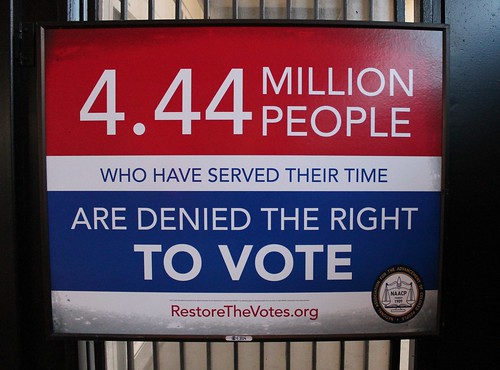Voter Emotions Matter
2018.01.22
|
One man, one vote. It's a phrase we've all heard and it kind of tugs at us. But the tugs are may be in different directions. You might well ponder where women come in to the picture, for example. And descendants of former slaves may feel strongly about how men among their ancestors were denied the right to vote.
The phrase may also ring hollow to the many with felony convictions who are permanently denied the right to vote, even today; in fact, many are denied the right to vote just for having a name similar to someone with a felony record. To advocates of alternative-voting systems, the focus may be more on the meaning of one vote than on the meaning of one man. Emotions are important. People do not often think just logically as emotions often comeplay. Voting itself is an emotional issue, not strictly and perhaps not even mainly a logical one. We are guided by wise old, often trite sayings, by habit of party affiliation, by stories we have heard, advertisements we have seen, and on rare occasions even by policy convictions. The point is that we are simply making a mistake when we think about voting methods without taking some account of the emotional baggage of typical voters. Consider, for example, an election very much like the ones we usually have, using plurality voting with only two candidates in the race. In this limited circumstance, plurality voting is, at least in a weak formal sense, a balanced voting system where it is just as easy to vote against a candidate as to vote for a candidate. To vote against candidate A, a voter only has to vote for candidate B and conversely. So we might think there should be nothing at all to be gained by using balanced-plurality voting instead. Why bother with a voting system any more complicated when the simpler and very familiar system is already, arguably, a balanced system. But in fact we cannot assume that voters think so logically. A voter who does not like either candidate A or candidate B may (with plurality voting) only being allowed to vote for one of the candidates, conclude that she cannot bring herself to vote for either candidate. She instead decides to just sit out the election and not vote, despite actually having a distinct preference between the two candidates. Alternatively, maybe such a voter will feel a responsibility to vote, so she instead casts a write-in ballot voting for her dog, herself or someone else who has no realistic chance of winning the election. It's a feel-good vote of course that has the identical effect on the election as not voting, but she does feel more responsible and perhaps even a little proud of voting but managing to find a way to avoid voting in favor of an unacceptable candidate. But now consider what might happen if the election were held using balanced-plurality voting, where voters can explicitly cast a vote for or against either candidate. That same voter might think differently about how to vote. After all, while she opposes both candidates and (in her mind) cannot vote for either one, in reality she does oppose candidate B considerably more than she opposes candidate A. By casting her vote against B, this voter can feel honest about participating in the election and gratified that it was with a truly meaningful vote that actually could effect the election results. Logically, a vote against B has exactly the same effect in the election as if she held her nose and voted for A, but the emotions are very different and in this case at least, emotions rule. Emotions have real effects on voting so they cannot just be ignored when choosing a voting method. And what about the day after the election? Voters learn that candidate B did actually win the election, but both candidates received negative net votes. B enters office with a negative 400,823 net votes compared with the negative 401,004 net votes cast for candidate A. The new Governor or new Senator takes office by a slim 181 net-vote margin but (importantly) with a negative net vote total. Quite clearly to everyone, this would be a win without anything remotely resembling a mandate. Compared to earlier election years when plurality voting was used, voter participation has increased significantly, so it is also harder for the new Senator to claim support from that silent majority of voters who did not show up to vote. A lesson here is that if you want to determine the wishes of the voters through an election, then voters have to be allowed to express their opinions quite explicitly and directly (and I should point out that his is a virtue common to all of the balanced-voting systems). In general, it is not really relevant that some logical technical argument can reveal a clever way to vote that will have some desired technical effect. If voters are not aware of the argument or not completely convinced by it, the argument suffers from a serious flaw that makes it inapplicable to a real election with real human, emotion-guided voters. |
